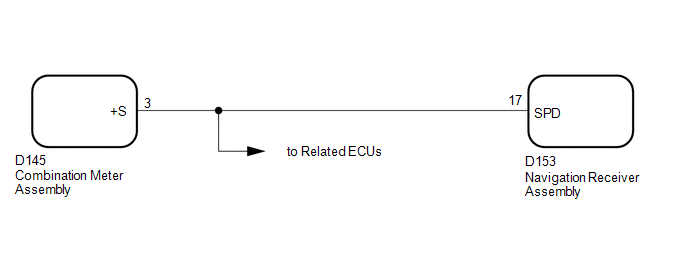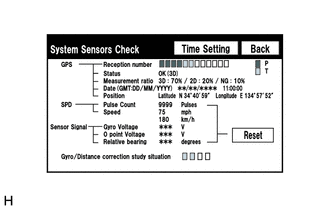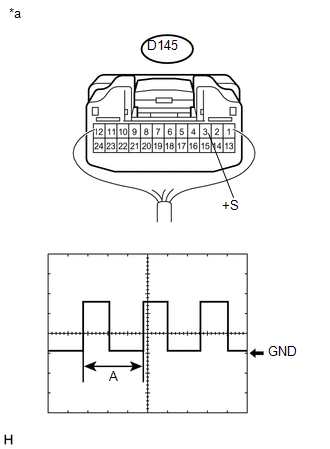- Navigation receiver assembly
- Combination meter assembly
- Harness or connector
- Meter/gauge System
| Last Modified: 08-28-2024 | 6.11:8.1.0 | Doc ID: RM100000000VJ71 |
| Model Year Start: 2016 | Model: Sienna | Prod Date Range: [12/2015 - 11/2017] |
| Title: NAVIGATION / MULTI INFO DISPLAY: NAVIGATION SYSTEM: B15C2; Speed Signal Malfunction; 2016 - 2017 MY Sienna [12/2015 - 11/2017] | ||
|
DTC |
B15C2 |
Speed Signal Malfunction |
DESCRIPTION
The navigation receiver assembly receives a vehicle speed signal from the combination meter assembly and information from the navigation antenna assembly, and then adjusts the vehicle position.
The navigation receiver assembly stores this DTC when the difference between the speed information that the navigation antenna assembly and the SPD pulse received from the combination meter assembly becomes large.
HINT:
- A voltage of 12 V or 5 V is output from each ECU and then input to the combination meter assembly. The signal is changed to a pulse signal at the transistor in the combination meter assembly. Each ECU controls its respective systems based on this pulse signal.
- If a short occurs in any of the ECUs or in the wire harness connected to an ECU, related components will not operate normally.
|
DTC No. |
DTC Detection Condition |
Trouble Area |
|---|---|---|
|
B15C2 |
A difference between the GPS speed and SPD pulse is detected |
|
WIRING DIAGRAM

PROCEDURE
|
1. |
CHECK SYSTEM SENSORS (OPERATION CHECK) |
|
(a) Enter the "System Sensors Check" screen. Refer to Check System Sensors in Operation Check (See page
|
|
(b) While driving the vehicle, compare the value of "Speed" to the reading on the speedometer. Check if these readings are almost equal.
HINT:
The combination meter assembly receives the vehicle speed signal from the skid control ECU via CAN communication. Therefore, perform the following inspection referring to values on the Data List of the skid control ECU because it is the source of the vehicle speed signal.
OK:
Vehicle speed displayed on the "System Sensors Check" screen is almost the same as the actual vehicle speed measured using the Techstream (See page
![2016 - 2017 MY Sienna [12/2015 - 11/2017]; NAVIGATION / MULTI INFO DISPLAY: NAVIGATION SYSTEM: DTC CHECK / CLEAR](/t3Portal/stylegraphics/info.gif) ).
).
| OK |

|
|
|
2. |
INSPECT COMBINATION METER ASSEMBLY (OUTPUT WAVEFORM) |
|
(a) Check the output waveform. (1) Remove the combination meter assembly with the connector(s) still connected. (2) Connect an oscilloscope to terminal D145-3 (+S) and body ground. (3) Turn the ignition switch to ON. (4) Turn a wheel slowly. (5) Check the signal waveform according to the condition(s) in the table below.
OK: The waveform is similar to that shown in the illustration. HINT: When the system is functioning normally, one wheel revolution generates 4 pulses. As the vehicle speed increases, the width indicated by (A) in the illustration narrows. Text in Illustration
|
|
| NG |

|
GO TO METER / GAUGE SYSTEM |
|
|
3. |
CHECK HARNESS AND CONNECTOR (NAVIGATION RECEIVER ASSEMBLY - COMBINATION METER ASSEMBLY) |
(a) Disconnect the D153 navigation receiver assembly connector.
(b) Disconnect the D145 combination meter assembly connector.
(c) Measure the resistance according to the value(s) in the table below.
Standard Resistance:
|
Tester Connection |
Condition |
Specified Condition |
|---|---|---|
|
D153-17 (SPD) - D145-3 (+S) |
Always |
Below 1 Ω |
| OK |

|
REPLACE NAVIGATION RECEIVER ASSEMBLY |
| NG |

|
REPAIR OR REPLACE HARNESS OR CONNECTOR |
|
|
|


